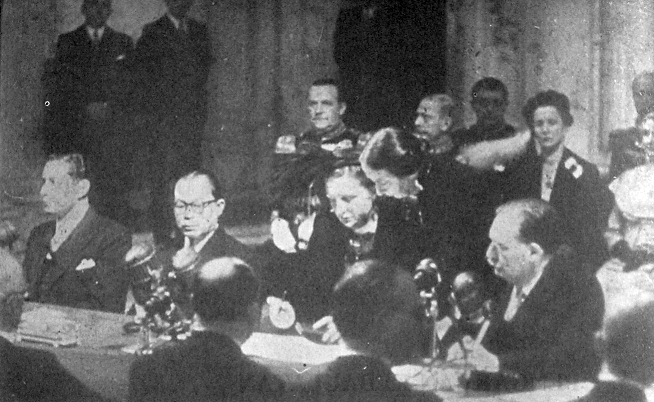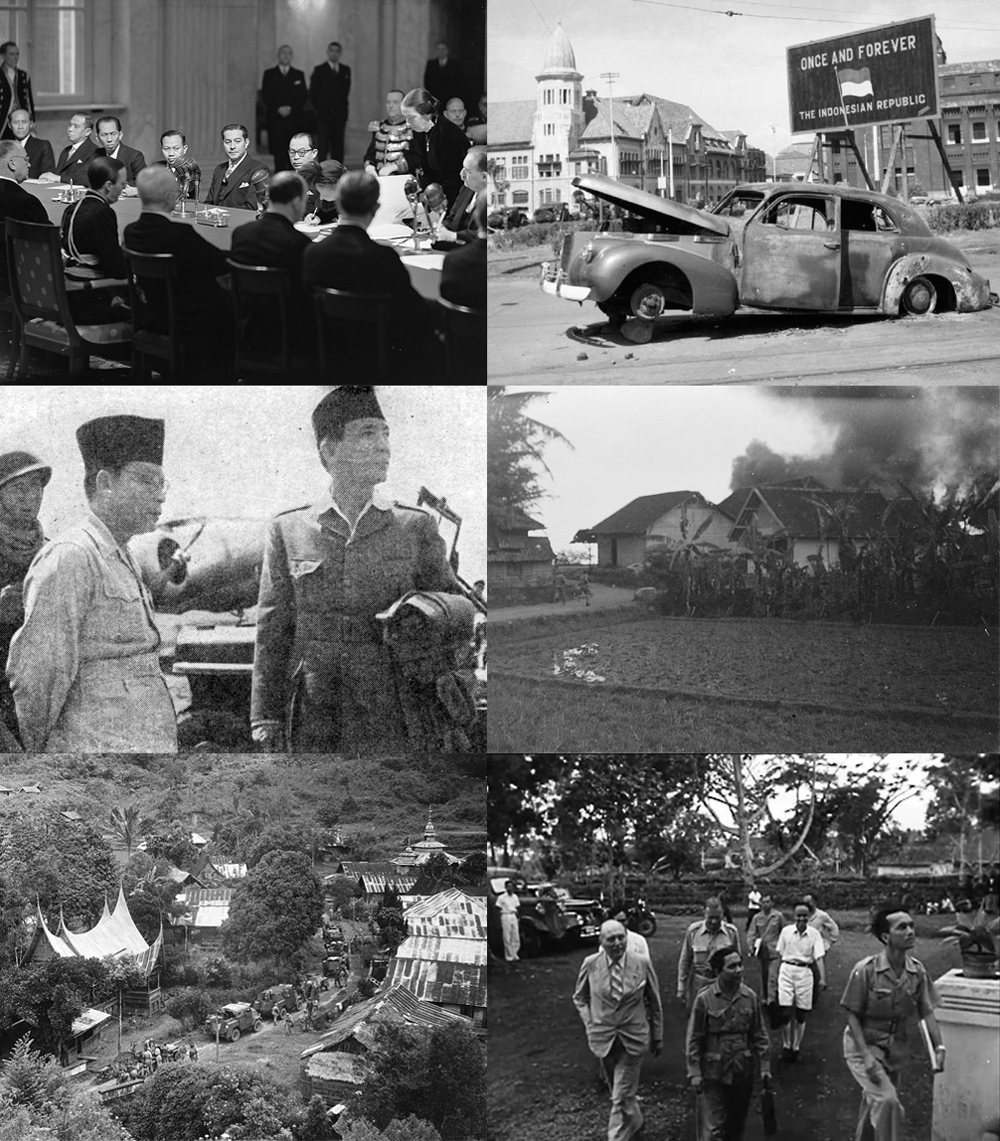|
Lambertus Nicodemus Palar
Lambertus Nicodemus Palar (5 June 1900 – 13 February 1981), also known as Babe Palar, represented the Republic of Indonesia in various diplomatic positions most notably as the first Indonesian representative to the United Nations. He also held ambassadorships in India, West Germany, the Soviet Union, Canada, and the United States. He was the son of Gerrit Palar and Jacoba Lumanauw. Early life and education Palar attended middle school ( nl, Meer Uitgebreid Lager Onderwijs (MULO)) in Tondano. He moved to Java to attend high school ( nl, Algeme(e)ne Middelbare School (AMS)) in Yogyakarta where he stayed with Sam Ratulangi. In 1922, Palar started his studies at the Technical University ( nl, Technische Hoogeschool) in Bandung, which is now known as the Bandung Institute of Technology ( id, Institut Teknologi Bandung (ITB)). At this school, Palar became acquainted with Indonesian nationalists such as Sukarno. A severe illness forced Palar to drop out of the school and to ret ... [...More Info...] [...Related Items...] OR: [Wikipedia] [Google] [Baidu] |
Permanent Representative Of Indonesia To The United Nations
The following are the list of Indonesia, Indonesian diplomats that served as Permanent Representative of the Republic of Indonesia to the United Nations: * Lambertus Nicodemus Palar, 1950–1953 * Sudjarwo Tjondronegoro, 1953–1957 * Ali Sastroamidjojo, 1957–1960 * Soekardjo Wirjopranoto, 1960–1962 * Lambertus Nicodemus Palar, 1962–1965 * Ruslan Abdulgani, Dr. H. Roeslan Abdulgani, 1967–1971 * Chaidir Anwar Sani, 1971–1979 * Abdullah Kamil, 1979–1982 * Ali Alatas, 1982–1988 * Nana Sutresna, 1988–1992 * Nugroho Wisnumurti, Noegroho Wisnumurti, 1992–1997 * Makarim Wibisono, 1997–2001 * Makmur Widodo, 2001–2004 * Rezlan Ishar Jenie, 2004–2007 * Marty Natalegawa, R.M. Marty M. Natalegawa, 2007–2009 * Hassan Kleib, 2010–2011 * Desra Percaya, 2012–2015 * Dian Triansyah Djani, 2016–2021 * Arrmanatha Christiawan Nasir, 2021–present See also *Indonesia and the United Nations *Foreign relations of Indonesia External linksMission of the Republic of Indone ... [...More Info...] [...Related Items...] OR: [Wikipedia] [Google] [Baidu] |
Sam Ratulangi
Dr. Gerungan Saul Samuel Jacob Ratulangi (also written as ''Ratu Langie''; 5 November 1890 – 30 June 1949) was a Minahasan teacher, journalist, politician, and national hero from North Sulawesi, Indonesia. He was part of the committee that ratified the Constitution of Indonesia and served as the first Governor of Sulawesi. Early life The son of Jozias Ratulangi and Augustina Gerungan, both from wealthy, well-respected Minahasa families, Sam Ratulangi was born on 5 November 1890 in Tondano in North Sulawesi, which at the time was a part of the Dutch East Indies. Jozias was a teacher at the ''Hoofden School'' (middle school for children of local village heads) in Tondano. He received teacher training in Haarlem, Netherlands around 1880. Augustina was the daughter of Jacob Gerungan, the ''Majoor'' (district chief) of Tondano-Touliang. Ratulangi was a gifted student, who studied at the local Dutch language elementary school (ELS or ''Europeesche Lagere School'') and then at the ... [...More Info...] [...Related Items...] OR: [Wikipedia] [Google] [Baidu] |
United Nations General Assembly
The United Nations General Assembly (UNGA or GA; french: link=no, Assemblée générale, AG) is one of the six principal organs of the United Nations (UN), serving as the main deliberative, policymaking, and representative organ of the UN. Currently in its 77th session, its powers, composition, functions, and procedures are set out in Chapter IV of the United Nations Charter. The UNGA is responsible for the UN budget, appointing the non-permanent members to the Security Council, appointing the UN secretary-general, receiving reports from other parts of the UN system, and making recommendations through resolutions. It also establishes numerous subsidiary organs to advance or assist in its broad mandate. The UNGA is the only UN organ wherein all member states have equal representation. The General Assembly meets under its president or the UN secretary-general in annual sessions at the General Assembly Building, within the UN headquarters in New York City. The main part of ... [...More Info...] [...Related Items...] OR: [Wikipedia] [Google] [Baidu] |
Roem–Van Roijen Agreement
The Roem–Van Roijen Agreement was an agreement made between Indonesian republicans and the Netherlands on 7 May 1949 at the Des Indes Hotel. The name was derived between the two principal negotiators at the meeting; Mohammad Roem and Jan Herman van Roijen. The purpose of the meeting was to iron out outstanding issues prior to Indonesian independence which was to be granted at the Round Table Conference at The Hague later that same year. Background On 19 December 1948, the Dutch made a final effort to gain control of the areas of their former colony of Indonesia, which had declared independence in 1945, that were still under the control of republican forces, by launching a "police action" known as Operation Kraai. Despite the military success of this operation, in which Dutch forces overcame Indonesian fighters and recaptured the whole of Java, including the Indonesian republican capital, Yogyakarta, there was worldwide condemnation, including from the United Nations ... [...More Info...] [...Related Items...] OR: [Wikipedia] [Google] [Baidu] |
United Nations Security Council
The United Nations Security Council (UNSC) is one of the six principal organs of the United Nations (UN) and is charged with ensuring international peace and security, recommending the admission of new UN members to the General Assembly, and approving any changes to the UN Charter. Its powers include establishing peacekeeping operations, enacting international sanctions, and authorizing military action. The UNSC is the only UN body with the authority to issue binding resolutions on member states. Like the UN as a whole, the Security Council was created after World War II to address the failings of the League of Nations in maintaining world peace. It held its first session on 17 January 1946 but was largely paralyzed in the following decades by the Cold War between the United States and the Soviet Union (and their allies). Nevertheless, it authorized military interventions in the Korean War and the Congo Crisis and peacekeeping missions in Cyprus, West New Guinea, and ... [...More Info...] [...Related Items...] OR: [Wikipedia] [Google] [Baidu] |
Police Action
In military/security studies and international relations, police action is a military action undertaken without a formal declaration of war. Today the term counter-insurgency is more used. Since World War II, formal declarations of war have been rare, especially actions conducted by developed nations in connection with the Cold War. Rather, nations involved in military conflict (especially the major-power nations) sometimes describe the conflict by fighting the war under the auspices of a "police action" to show that it is a limited military operation different from total war. The earliest appearance of the phrase was in 1883, referring to attempts by Netherlands forces and English forces to liberate the 28-man crew of the SS ''Nisero'', who were held hostage. The Dutch term ''politionele acties'' (police actions) was used for this. The Merriam-Webster's Collegiate Dictionary: Eleventh Edition called it in its 1933 issue; a localized military action undertaken without formal d ... [...More Info...] [...Related Items...] OR: [Wikipedia] [Google] [Baidu] |
Indonesian National Revolution
The Indonesian National Revolution, or the Indonesian War of Independence, was an armed conflict and diplomatic struggle between the Republic of Indonesia and the Dutch Empire and an internal social revolution during postwar and postcolonial Indonesia. It took place between Indonesia's declaration of independence in 1945 and the Netherlands' transfer of sovereignty over the Dutch East Indies to the Republic of the United States of Indonesia at the end of 1949. The four-year struggle involved sporadic but bloody armed conflict, internal Indonesian political and communal upheavals, and two major international diplomatic interventions. Dutch military forces (and, for a while, the forces of the World War II allies) were able to control the major towns, cities and industrial assets in Republican heartlands on Java and Sumatra but could not control the countryside. By 1949, international pressure on the Netherlands, the United States threatening to cut off all economic ... [...More Info...] [...Related Items...] OR: [Wikipedia] [Google] [Baidu] |
Indonesian Declaration Of Independence
The Proclamation of Indonesian Independence ( id, Proklamasi Kemerdekaan Indonesia, or simply ''Proklamasi'') was read at 10:00 on Friday, 17 August 1945 in Jakarta. The declaration marked the start of the diplomatic and armed resistance of the Indonesian National Revolution, fighting against the forces of the Netherlands and pro-Dutch civilians, until the latter officially acknowledged Indonesia's independence in 1949. The document was signed by Sukarno (who signed his name "Soekarno" using the Van Ophuijsen orthography) and Mohammad Hatta, who were appointed president and vice-president respectively the following day. The date of the Proclamation of Indonesian Independence was made a public holiday by a government decree issued on 18 June 1946. Background The beginnings of the independence movement In 1918, the Dutch authorities in the Dutch East Indies established a partly-elected People's Council, the '' Volksraad'', which for the first time gave Indonesian nationalis ... [...More Info...] [...Related Items...] OR: [Wikipedia] [Google] [Baidu] |
Kroncong
Kroncong (pronounced "kronchong"; id, Keroncong, nl, Krontjong) is the name of a ukulele-like instrument and an Indonesian musical style that typically makes use of the kroncong (the sound ' comes from this instrument, so the music is called ''kroncong''). A ''kroncong'' orchestra or ensemble traditionally consists of a flute, a violin, at least one, but usually a pair of ''kroncongs'', a cello in pizzicato style, string bass in pizzicato style, and a vocalist. ''Kroncong'' originated as an adaptation of a Portuguese musical tradition, brought by sailors to Indonesian port cities in the 16th century. By the late 19th century, ''kroncong'' reached popular music status throughout the Indonesian archipelago. Characteristics The name "Kroncong" may be derived from the jingling sound of the ''kerincing rebana'', as heard in the rhythmic background of the music created by the interlocking of instruments playing on or off beat. This background rhythm runs faster than the often slow ... [...More Info...] [...Related Items...] OR: [Wikipedia] [Google] [Baidu] |
Reichskommissariat Niederlande
The ''Reichskommissariat Niederlande'' was the civilian occupation regime set up by Germany in the German-occupied Netherlands during World War II. Its full title was the Reich Commissariat for the Occupied Dutch Territories (german: Reichskommissariat für die besetzten niederländischen Gebiete). The administration was headed by Arthur Seyss-Inquart, formerly the last chancellor of Austria before initiating its annexation by Germany (the ''Anschluss''). Introduction The German domination of the Netherlands began with the German invasion. On the day of the capitulation (15 May 1940) the entire ministerial staff fled to London to form a Dutch government in exile. Queen Wilhelmina had already preceded them the previous day. This had ''de facto'' left government authority in the hands of general Henri Winkelman as the senior-most military commander in the Netherlands. On 20 May 1940 a military administration was initially implemented, led by ''Militärsbefehlshaber'' Alexa ... [...More Info...] [...Related Items...] OR: [Wikipedia] [Google] [Baidu] |




.jpg)


